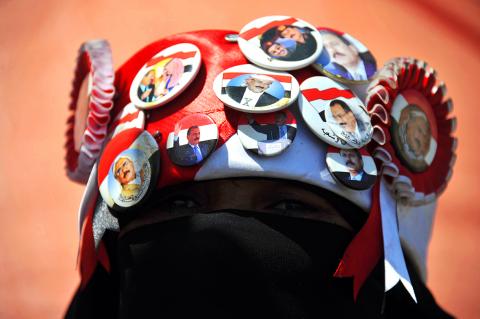Yemeni President Ali Abdullah Saleh made a surprise return to Yemen yesterday after more than three months of medical treatment in Saudi Arabia in a move certain to further enflame battles between forces loyal to him and his opponents that have turned the capital into a war zone.
Saleh immediately called for a ceasefire and said negotiations were the only way out of the crisis, his office said. The statement, however, suggested he does not intend to step down immediately and was likely to only anger protesters who have been demanding his ouster for months and the military units and armed tribal fighters that back the opposition.
“His return means more divisions, more escalation and confrontations,” said Abdel-Hadi al-Azazi, a protest leader. “We are on a very critical escalation.”

Photo: EPA
Saleh’s return to Yemen could further damage already crumbling efforts by the US and Saudi Arabia to work out a peaceful handover of power. Washington is eager for some sort of post-Saleh stability in the strategically placed, but deeply divided and impoverished nation in hopes of continuing an alliance against al-Qaeda militants in Yemen.
Both the US and Saudi Arabia were believed to be trying to keep Saleh from leaving Saudi Arabia.
Saleh went to the kingdom for treatment after he was severely burned and wounded by a June 3 explosion at his presidential compound in the capital Sana’a. His departure fueled hopes that he would be forced to step down, but instead he staunchly refused to resign, frustrating protesters who have been taking to the streets nearly daily since February demanding an end to his 33-year rule.
As time passed and Saleh recuperated, he was widely expected to stay in the kingdom — and his return yesterday was a surprise.
The crackle of gunfire continued over Sana’a even after Saleh’s office issued the ceasefire call.
This week, the long deadlock that endured even during Saleh’s absence broke down into the worst violence in months, as forces loyal to the president’s son attacked protesters and battled troops led by one of the regime’s top rivals, Major General Ali Mohsen al-Ahmar, a former Saleh aide who joined the opposition early in the uprising.
About 100 people have been killed in the past week — mostly protesters, as regime troops hit their gatherings with shelling or barrages of sniper fire from rooftops.
The fighting continued even after Saleh returned at dawn yesterday. Heavy clashes and thuds of mortars were heard throughout the night in Sana’a. One person was killed overnight, a medical official said on condition of anonymity.
By noon, thousands of Saleh supporters and opponents poured into the streets for parallel rallies in different parts of Sana’a. The rallies revolved around Friday prayers and also included funeral ceremonies for those from each side killed in the clashes.
Reflecting Yemen’s widening rift, each side blamed the other for igniting the latest violence.

SECURITY: As China is ‘reshaping’ Hong Kong’s population, Taiwan must raise the eligibility threshold for applications from Hong Kongers, Chiu Chui-cheng said When Hong Kong and Macau citizens apply for residency in Taiwan, it would be under a new category that includes a “national security observation period,” Mainland Affairs Council (MAC) Minister Chiu Chui-cheng (邱垂正) said yesterday. President William Lai (賴清德) on March 13 announced 17 strategies to counter China’s aggression toward Taiwan, including incorporating national security considerations into the review process for residency applications from Hong Kong and Macau citizens. The situation in Hong Kong is constantly changing, Chiu said to media yesterday on the sidelines of the Taipei Technology Run hosted by the Taipei Neihu Technology Park Development Association. With

CARROT AND STICK: While unrelenting in its military threats, China attracted nearly 40,000 Taiwanese to over 400 business events last year Nearly 40,000 Taiwanese last year joined industry events in China, such as conferences and trade fairs, supported by the Chinese government, a study showed yesterday, as Beijing ramps up a charm offensive toward Taipei alongside military pressure. China has long taken a carrot-and-stick approach to Taiwan, threatening it with the prospect of military action while reaching out to those it believes are amenable to Beijing’s point of view. Taiwanese security officials are wary of what they see as Beijing’s influence campaigns to sway public opinion after Taipei and Beijing gradually resumed travel links halted by the COVID-19 pandemic, but the scale of

A US Marine Corps regiment equipped with Naval Strike Missiles (NSM) is set to participate in the upcoming Balikatan 25 exercise in the Luzon Strait, marking the system’s first-ever deployment in the Philippines. US and Philippine officials have separately confirmed that the Navy Marine Expeditionary Ship Interdiction System (NMESIS) — the mobile launch platform for the Naval Strike Missile — would take part in the joint exercise. The missiles are being deployed to “a strategic first island chain chokepoint” in the waters between Taiwan proper and the Philippines, US-based Naval News reported. “The Luzon Strait and Bashi Channel represent a critical access

Pope Francis is be laid to rest on Saturday after lying in state for three days in St Peter’s Basilica, where the faithful are expected to flock to pay their respects to history’s first Latin American pontiff. The cardinals met yesterday in the Vatican’s synod hall to chart the next steps before a conclave begins to choose Francis’ successor, as condolences poured in from around the world. According to current norms, the conclave must begin between May 5 and 10. The cardinals set the funeral for Saturday at 10am in St Peter’s Square, to be celebrated by the dean of the College